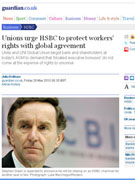UK media cover Bank on Rights action at HSBC shareholder meeting

A union delegration went inside the meeting to ask company executives why they won't negotiate a global agreement.
Unite the union and UNI Global Union, along with trade unions around the world, told HSBC and its shareholders today (Friday 28th) at their annual meeting that the company needs a global agreement to protect workers’ right to unionise. The unions called for HSBC to set an international standard for working conditions to ensure the company acts responsibly.
Read the full articles online at The Guardian’s website and The Morning Star’s website.
Unite, which represents thousands of unionised workers, was at the HSBC annual shareholder meeting in London leafleting shareholders and carrying placards calling on HSBC to ‘Give Workers Equal Rights’.
Cath Speight, Unite national officer said: “Our unions have come together to urge the shareholders of HSBC to honour their corporate social responsibilities to meet the highest standards of governance and dignity and respect for all HSBC workers in whatever part of the world they work.
“Throughout the world, workers are raising their concerns but are not being heard. A global agreement will mean workers have the right to belong to a trade union, to organise, and to be treated with fairness and respect. UNI and HSBC unions around the world also want a global agreement to ensure bloated executive bonuses don't come at the expense of workers' rights.”
Top HSBC executives are getting huge pay packets while ordinary workers pay the price for the economic downturn. To compensate for cuts in staff, employees across the globe report they do more work for less pay, staying late and coming in on weekends with little or no overtime compensation.
HSBC Head of investment banking Stuart Gulliver got £10 million last year. US workers, however, were paid just above minimum wage, forced to shell out hundreds monthly for health insurance.
CEO Michael Geoghegan got £4.3 million. But in Colombia, HSBC fired workers after they joined the union.
A global agreement will fight these types of inequalities worldwide. It will mean unions will be able to discuss workers’ issues with HSBC management locally and globally, so problems can be resolved quickly.
Such an agreement will also help HSBC’s workers focus on customers’ needs instead of aggressive sales targets.
“We have been troubled by the reports that we have heard from workers in most of HSBC’s biggest markets of employees being forced to aggressively sell products and services to customers, in many cases despite the customers needs not because of them,” said Head of UNI Finance Oliver Roethig. “With a global agreement, the company will join us in a partnership to work on a transnational basis to modify this risky practice – for the good of HSBC, its investors and the workers.”

